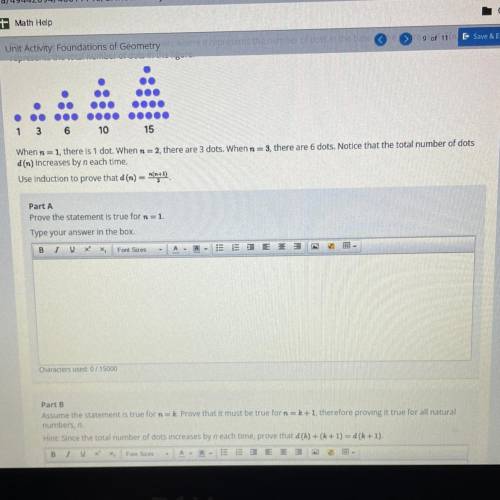
Mathematics, 11.10.2021 08:10 DaylaReevaFEEVA2757
When n=1 there is 1 dot. when n=2 there are 3 dots, when n=3 there are 6 dots. notice that the total number of dots increases by n each time.
use induction to prove that
d(n)= n(n+1)/2
part A: prove the statement is true for n=1
part B: Assume that the statement is true for n=k + 1, therefor proving it true for all natural numbers, n.
hint* since the total number of dots increase by n each time, prove that d(k) + (k+1) = d (k+1)
*please answer i really need help!!


Answers: 3


Another question on Mathematics

Mathematics, 21.06.2019 13:30
Nell has a sales clerk job that pays $12 per hour for regular gas work hours. she gets double time for any hours over 40 that she works in a week. how many hours did nell work if her weekly pay was $744
Answers: 1

Mathematics, 21.06.2019 16:30
What is the area of a pizza with a radius of 40 cm leave the answer in terms of π to find your exact answer 40π cm² 1600π cm² 800π cm² 80π cm² π=pi
Answers: 1

Mathematics, 21.06.2019 17:00
Acylinder has volume 45π and radius 3. what is it’s height?
Answers: 2

Mathematics, 22.06.2019 00:00
A6 ounce bottle of dressing costs $1.56 a 14 ounce bottle costs $3.36 a 20 ounce bottle costs $5.60 which has the lowest cost per ounce
Answers: 1
You know the right answer?
When n=1 there is 1 dot. when n=2 there are 3 dots, when n=3 there are 6 dots. notice that the total...
Questions









Biology, 11.03.2020 02:00







Computers and Technology, 11.03.2020 02:00

Computers and Technology, 11.03.2020 02:00

Computers and Technology, 11.03.2020 02:00


Mathematics, 11.03.2020 02:00



